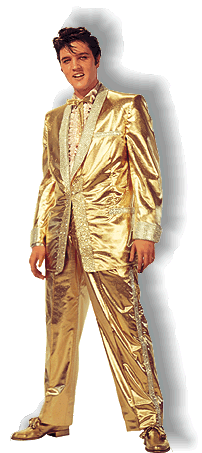 www.elvis.com
www.elvis.com |
Movie Studio History, 4 / 4
A look into the history of the
movie business and the various movie studios for which Elvis made his
films:
In Parts 1 - 3 of this series, we have seen that Elvis was under
contract to more than one studio at a time and made several movies a
year. We have also seen that, with the each contract renewal, Elvis's
manager Colonel Tom Parker would work to get his client a better deal.
In November of 1963, Colonel Parker made a deal for one Elvis picture
with Allied Artists for $600,000 plus $150,000 for expenses and 50% of
the profits. Elvis' s $750,000 was more than half of the total budget
for the film. The movie made under this agreement was "Tickle Me",
filmed in the fall of 1964 and released in July of 1965. It quickly
earned back its costs and, for a time, saved the financially struggling
Allied Artists company.
Allied Artists was established in 1946 as Allied Artists Productions, a
subsidiary of Monogram Pictures, which produced low budget, B picture
series such as "Charlie Chan", "The Bowery Boys" and "The East Side
Kids". Allied was formed to produce Monogram 's higher budget films. By
1953, Monogram itself became known as Allied Artists and had little
success until they released Elvis's film "Tickle Me". They sold their
production studio in 1967 and focused instead on releases of foreign
films. They returned to production in the 1970's making films such as "Papillon"
and "The Man Who Would Be King", but financial problems continued and
they filed for bankruptcy in 1979. The studio was sold to Lorimar
Productions in 1980. Today, their old studio houses KCET, the Los
Angeles PBS television station.
Elvis made one film for National General Pictures - "Charro!" in 1968.
Elvis was paid $850,000 plus 50% of the profits. The movie was released
nationally in March of 1969. We were unable to find any further
information on the history of this production company.
Elvis's thirty-first and final feature film as an actor was "Change of
Habit", made for co-producers Universal Studios and NBC as part of the
deal that Colonel Parker worked out to make the 1968 TV special "Elvis".
Universal was formed in 1912 as Universal Film Manufacturing Company by
Bavarian immigrant Carl Laemmle. He had companies on both coasts.
Wanting to consolidate his businesses, in 1914 he purchased 230 acres of
ranch land near Los Angeles. In 1915 he officially opened the gates of
Universal City, the world's first self-contained community dedicated to
making movies. And they offered tours to visitors with a
behind-the-scenes look at the making of films. They suspended the tours
in the 1920's when producers of the new "talkies" demanded a quiet set.
Some of their early films were "The Hunchback of Notre Dame", "The
Phantom of the Opera" and the Academy Award winning "All Quiet On the
Western Front". They also had a series of successful horror films that
included "Dracula", "The Mummy", "Frankenstein" and "Bride of
Frankenstein".
Mr. Laemmle retired in 1936, selling the company to Standard Capital
Company. They then specialized in musical and comedy films such as the
"Abbott and Costello" series and the "Francis the Talking Mule" series.
Universal merged with International Pictures in 1946. The company was
bought again in 1952, this time by Decca Records. Among their hit films
were "Pillow Talk", "Operation Petticoat", "To Kill A Mockingbird", and
"Spartacus".
In 1958, MCA, Inc. (Music Corporation of America) purchased Universal
City Studios lot and in 1962 they officially merged. The studio tours
were restarted in 1964. Movies such as "Jaws" and "ET: The Extra
Terrestrial" were produced and they became very involved in television
production as well. In 1991, Matsushita Electrical Industrial Co., Ltd.
acquired MCA and in 1995 The Seagram Company Ltd. acquired it from
Matsushita. In 2000 Seagram combined with France's Vivendi and Canal+.
Today Universal Studios is a part of Vivendi Universal, a global media
and communications company. |

 www.elvis.com
www.elvis.com